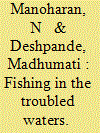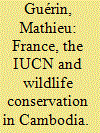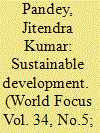| Srl | Item |
| 1 |
ID:
157793


|
|
|
|
|
| Summary/Abstract |
India’s relations with its neighbours in the maritime domain have received less scholarly attention. Those studies that deal with India’s relations with its South Asian neighbours generally touch on political security, socio-cultural and economic issues. The maritime aspect is either ignored or tucked in as a part of other dimensions. The present study attempts to fill the gap in the literature by taking up the case of Sri Lanka. Sri Lanka is chosen as a case, not only because the island state is India’s closest maritime neighbour but also due to the existence of deep interactions between the two countries in diverse fields both at governmental and non-governmental levels. In the maritime domain, in the present context, technically speaking, there is no problem between the two countries. However, the fishermen issue remains one of the issues principally because of the Tamil Nadu factor. Analysing the issue in five phases, the study argues for a ‘comprehensive approach’ for its settlement.1
|
|
|
|
|
|
|
|
|
|
|
|
|
|
|
|
| 2 |
ID:
188722


|
|
|
|
|
| Summary/Abstract |
The history of wildlife conservation in Cambodia in the twentieth century reveals the tensions that existed between the Khmer kingdom and international nature conservation networks, colonial or global. Wildlife conservation in Cambodia was not a priority for the French colonial administration. It only regulated hunting. While the global conservation movement was expanding via international conferences, local French administrators managed to obstruct the implementation of a conservation policy. After the Second World War, Western scientists and activists sought to establish reserves, particularly to protect a new species of wild cattle, the kouprey. The International Union for the Conservation of Nature (IUCN), through the notable efforts of Harold Coolidge, succeeded in convincing Prince Sihanouk to adopt such a policy in the 1960s. However, although 12 per cent of the kingdom's land was protected, funding and means for conservation remained largely inadequate. The war put an end to all conservation programmes. The IUCN renewed its efforts in the 1980s successfully establishing a network of protected areas in Cambodia in 1993. The various twentieth-century Cambodian wildlife conservation policies, which all imposed external models, often without prior adequate field studies or involvement of local populations, have failed to prevent emblematic species from disappearing.
|
|
|
|
|
|
|
|
|
|
|
|
|
|
|
|
| 3 |
ID:
120954


|
|
|